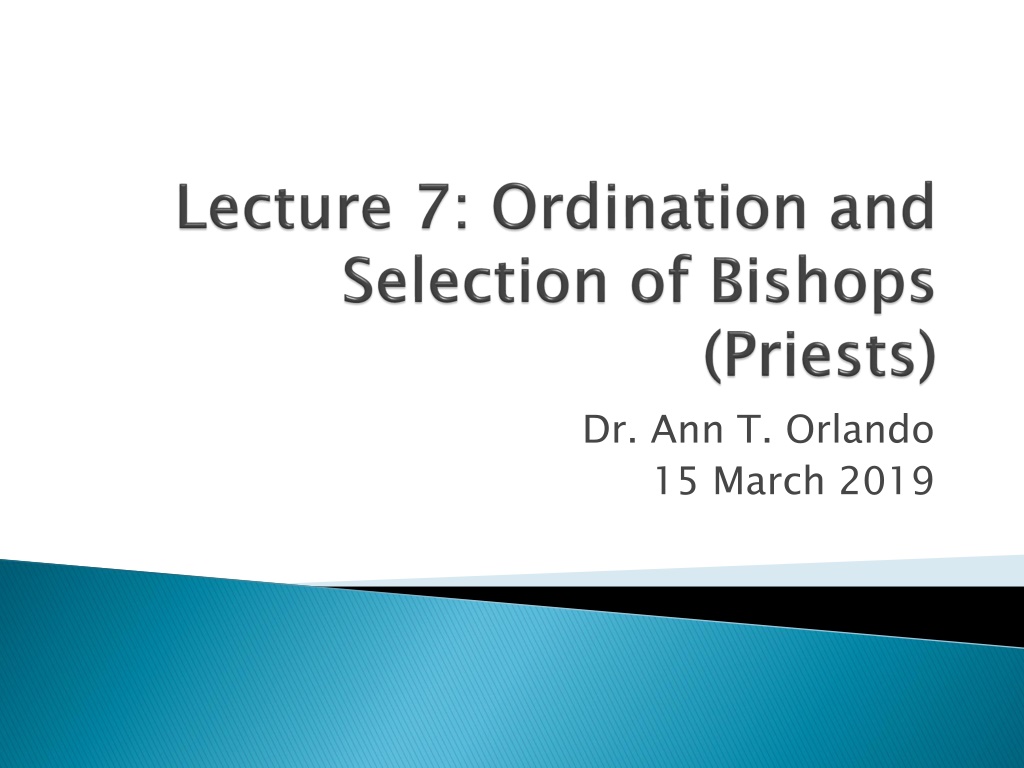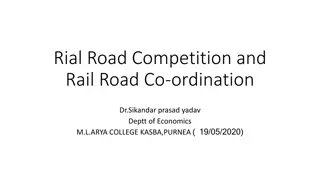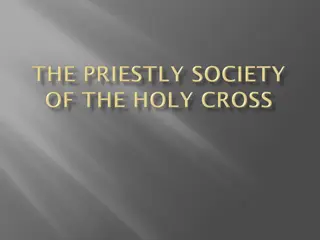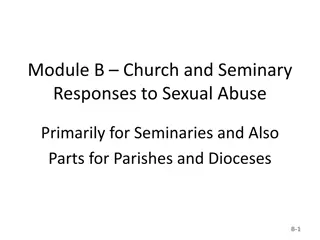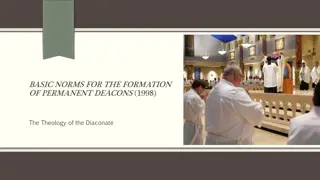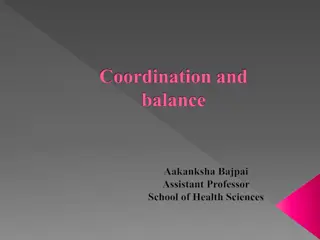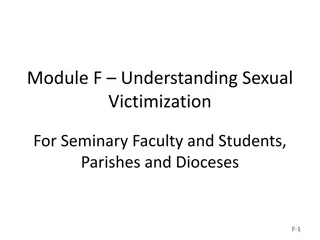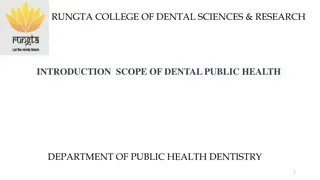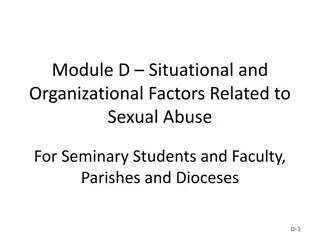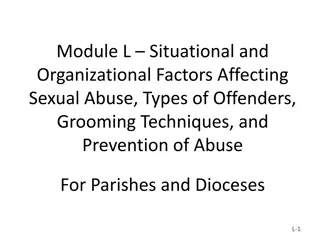Understanding the Significance of Ordination and Laying on of Hands in Religious Traditions
Exploring the historical and symbolic significance of ordination, selection of bishops, and the laying on of hands in religious ceremonies. From the ancient practices to their relevance in modern times, this content delves into the rituals and meanings behind these sacred traditions.
Download Presentation

Please find below an Image/Link to download the presentation.
The content on the website is provided AS IS for your information and personal use only. It may not be sold, licensed, or shared on other websites without obtaining consent from the author. Download presentation by click this link. If you encounter any issues during the download, it is possible that the publisher has removed the file from their server.
E N D
Presentation Transcript
Dr. Ann T. Orlando 15 March 2019
Meaning of ordination Selection of Bishops Clerical and Popular acclaim Recognition and ordination by other bishops Aversion to being a bishop Gregory Nazianzus How Augustine became bishop of Hippo Assignments
To be chosen, based on Greek word for hand, cheir Laying (or raising) of hands In antiquity could be used to indicate a vote of approval, or to symbolize a transfer of power In LXX Lev 16:21 Aaron placed his hand on the sacrificial goat that will carry the sins of the people on Day of Atonement Dt 34:9, Moses laid his hands on Joshua to transfer power to him; note reference to the Spirit of wisdom coming on Joshua
In Acts 6:1-6 ministry of deacons established by laying on of hands, power of Holy Spirit 13:1-3 Paul and Barnabas are commissioned for their ministry by the laying on of hands, power of Holy Spirit In Pastorals I Tm 4:14, office and gift of prophecy 2 Tm 1:6, office and spirit of power
Tertullian, On Baptism 8, describes laying on of hands by bishop to confer the Holy Spirit at baptism Hippolytus, Apostolic Tradition: Comparison of Greek and Latin manuscripts for the laying on of hands(Greek)/ordination (Latin) of bishops See Apostolic Constitutions
Meaning to become a member of an ordo An ordo is a Roman social rank; each rank has obligations, privileges and ordinances governing it Senators, equestrians, decurians, military veterans Plebeians, free foreigners, slaves Constantine the Great makes bishops a Roman order
I Clement 40-44; The laity are bound by the ordinances of the laity (laikos) Rank (tagma) Written in Greek, but with a Roman legal environment Tertullian, On Baptism 17 Laicis do not have the privilege of baptizing, which belongs to the higher rank of bishop
Bishops are chosen from ranks of the Christian faithful NOT hereditary (see Origen Homily on Numbers 13) Unlike Roman and Jewish priesthood In early Church in some places Selected by council of elders (presbyterate) Elected by the faithful Combination Bishop is ordained by laying on of hands of other bishops, not by community Presbyters seem to have been suggested by community of believers, but selected and ordained by bishops By 4thC in many places, being ordained presbyter was often with the expectation of becoming a bishop
A Synodal Letter Issue: Bishops who have apostasized or are leading public lives of bad conduct Note discussion of how bishops are elected and why neighboring bishops perform the ordination
Develops especially in 4thC After time of martyrdom, contemplative life seen as much preferable With Constantine the Great, bishops take on increased secular administrative roles Local magistrates in dioceses (Roman legal administrative area) Community of faithful increasingly a mixed group Political advantages to being a Christian (Orthodox or Arian) Economic and social advantages for clergy
Knew Athanasius as a young man; wrote a funeral oration for Athanasius Very close friend of Basil; studied in Athens with him Great rhetorician and poet As young men, Gregory and Basil go to Pontus to study in a monastery Gregory returns to Nazianzus where his father is bishop Father ordains him presbyter in 361 Expectation is that Gregory will become bishop when his father dies But Gregory feels unworthy and flees back to Pontus 11
Gregory encouraged to return to his station by his father and Basil Upon his return to Nazianzus (362), Gregory was met with anger and disappointment from the community To try and explain his action, he offered this oration This Oration will be foundational for later works on qualifications and duties of priesthood Gregory also wrote a funeral oration for his father, who died soon after his return
The rest of the story: Gregory named Patriarch of Constantinople 380 Presided at Second Ecumenical Council, 381. During the Council, Gregory resigned at Patriarch of Constantinople, returning to Nazianzus Sermons on Christology and Trinity very influential St. Jerome was his disciple in Constantinople Known as The Theologian Gregory died in 390, we celebrate his feast jointly with St Basil on Jan 2
Written after his retirement, as a reflection on his life Handout is in three parts: Beginning of poem, 1-90 His ordination, 265-605 Excerpt from speech at Council of Constantinople, 1670-1675
Also did not want to be a bishop Possidius in his Life of Augustine, gives an account of Community selection of Augustine for presbyter and his ordination by Valerius Valerius petition to bishop of Carthage make Augustine coadjutor bishop of Hippo
Younger brother of Basil and Macrina Married (perhaps to sister of Gregory Nazianzus??) May have been bishop of Nyssa; wrote catechetical instructions Philosophically very influenced by Origen and NeoPlatonism Also very deeply influenced by his sister, Macrina Life of Macrina Macrina as The Teacher in On the Resurrection 16
Epiphany celebrated in East as the Baptism of the Lord Festival of Light Manifestation of Christ to the world Epiphany very important in Church liturgical calendar Presentation of those to be baptized at Easter vigil Bishop presents the annual liturgical calendar (Festal Letter) Nyssa s homily notes important changes through sacramental actions Including change in a man at ordination
Origen, Homilies on Numbers, Homily 13 Cyprian, Letter 67 (not 55) Constitutions of the Holy Apostles VIII.ii-v, xxvii-xxviii Gregory Nazianzus, Oration 2: On Flight Selections from poem, De Vita Sua Gregory of Nyssa, On Baptism of the Lord Prepare paper #7
